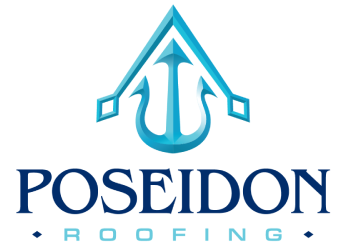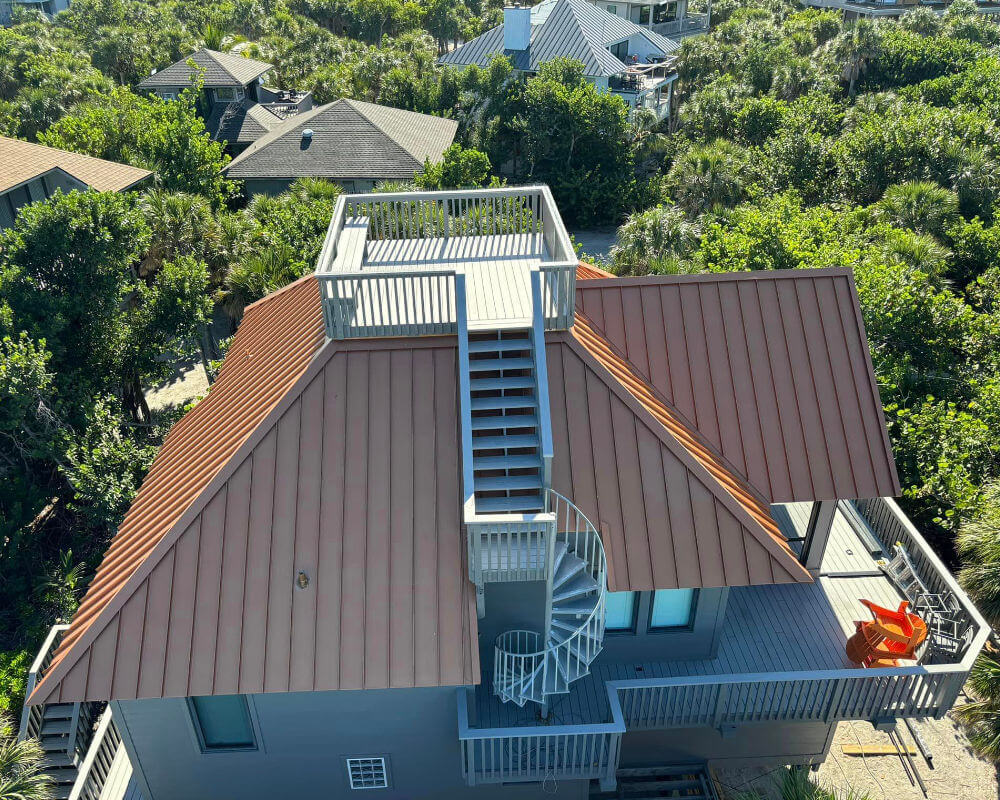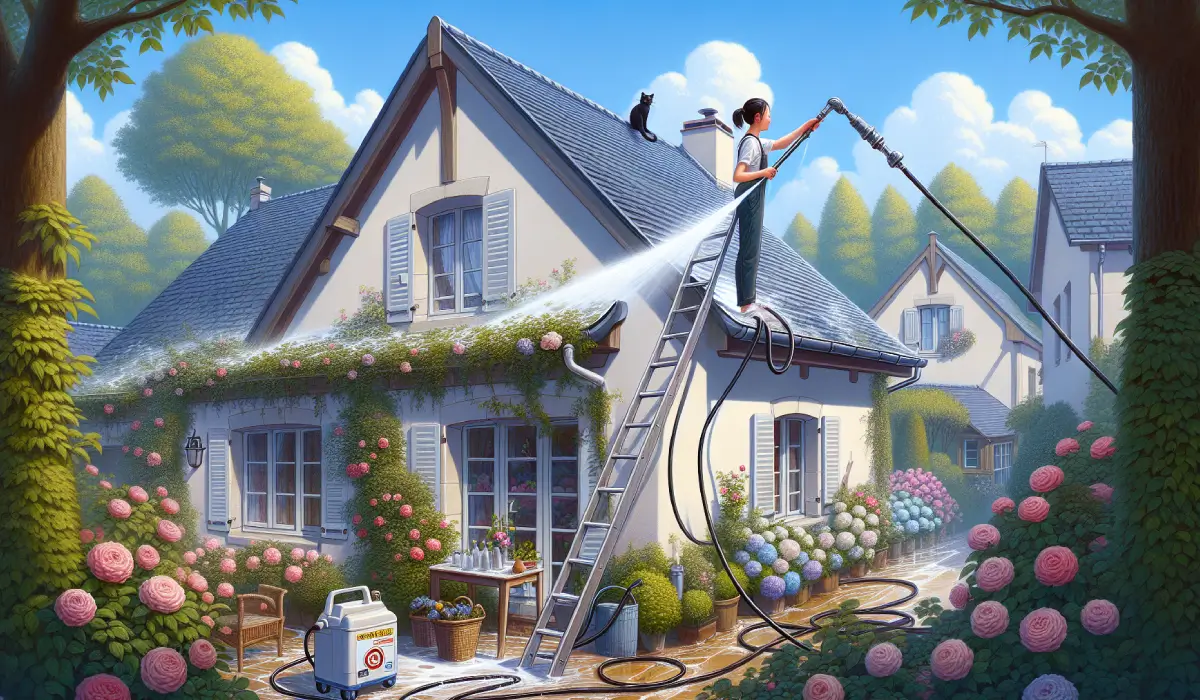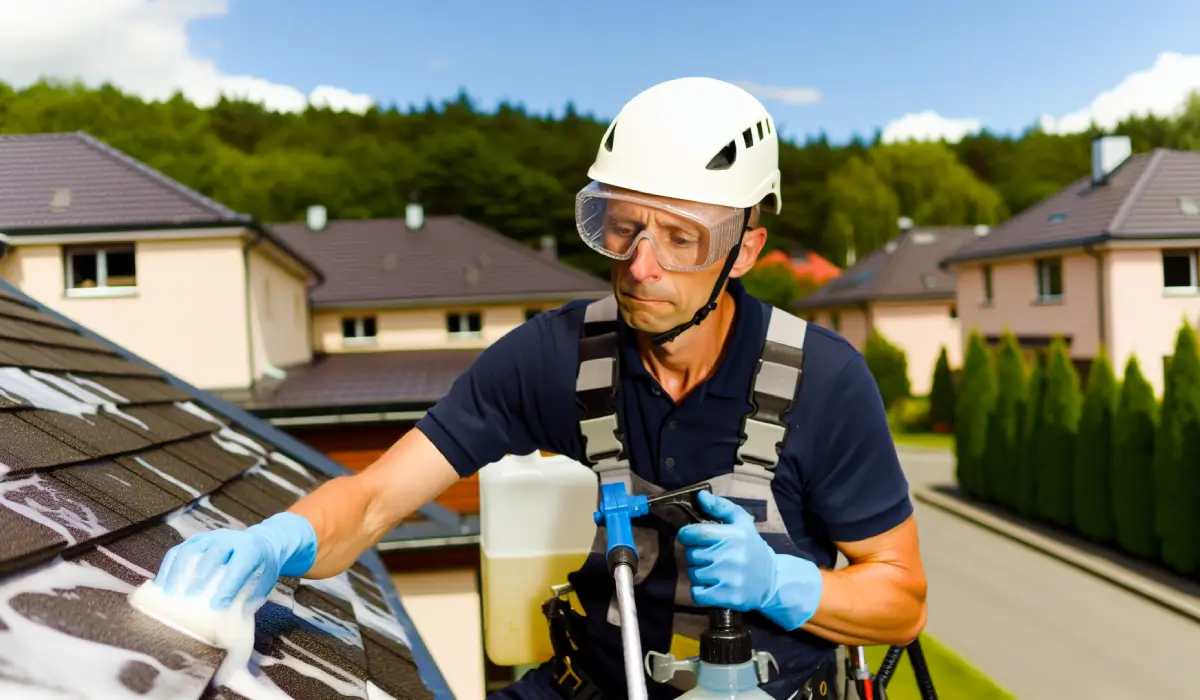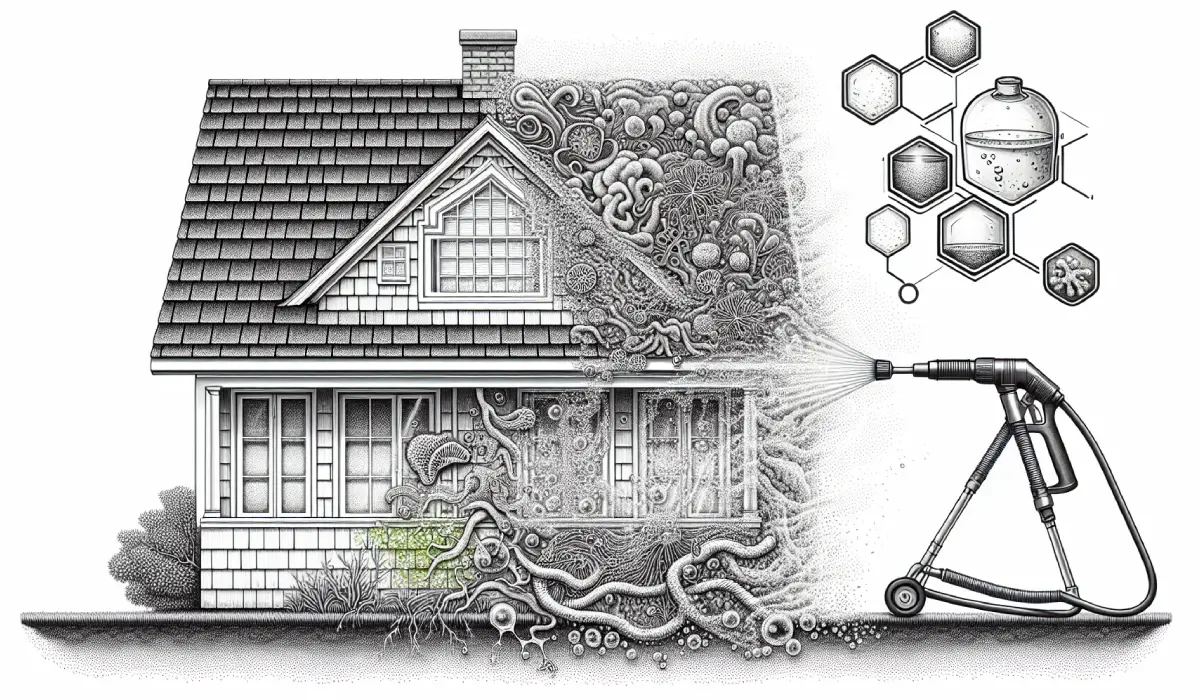What exactly is roof soft washing, and how does it protect your home’s top layer? Roof soft washing is a modern, gentle cleaning method, that relies on low-pressure washing techniques and specialized cleaning solutions to remove dirt and prevent damage to your roof.
Key Takeaways
- Soft washing is a low-pressure roof cleaning technique that uses specialized cleaning solutions to remove dirt and organic growth like algae effectively, without causing damage to the roofing materials.
- This method is gentler than high-pressure washing, lessening the risk of harm to the roof and extending its lifespan, making it both a cost-effective and safe cleaning alternative for various types of roofs
Imagine a cleaning method that can delicately remove years of accumulated grime from your roof without the brute force that often causes more harm than good. This is the essence of softwash roof cleaning—a technique that employs low-pressure equipment and specialized cleaning solutions to meticulously clean your roof surface. In soft washing, pressure washers are tweaked to produce a broad spray or low-pressure nozzle, preserving the structural integrity of your roofing materials, whether they are asphalt shingles or clay tiles. Soft wash cleaning, when done using the soft wash method, ensures a thorough and safe roof-washing experience.
Soft washing isn’t limited to a single application; its versatility makes it suitable for various roofing materials, including:
- Shingles
- Clay tiles
- Concrete tiles
- Metal roofs
The rising popularity of soft washing attests to its effectiveness. Homeowners and cleaning services alike are turning to this method as it combines the best of both worlds: effectiveness and a gentle approach. In contrast to pressure washing, soft washing takes a careful approach, avoiding needless deterioration of the roof.
The Benefits of Choosing Soft Wash Over High-Pressure Washing
Soft wash roof cleaning is the ally your roof needs, offering a thorough clean without the aggressive tactics of high-pressure washing. This gentle approach ensures that shingles remain intact, free from the damage that high pressure can inflict, such as stripping away protective granules or causing tiles to shift.
What sets soft washing apart are:
- The specialized cleaning solutions work in unison with the low pressure to efficiently remove dirt, debris, and stains
- These solutions are often unable to be tackled by water alone, highlighting the nuanced capability of soft-washing
- It greatly reduces the risk of damage to the roof, siding, and other surfaces, ensuring that your property remains in pristine condition.
Consider the aftermath of using high-pressure methods—potential long-term damage that can lead to expensive repairs. At this juncture, soft washing outshines other methods, including power washing and pressure washing, by offering a budget-friendly, damage-free cleaning alternative, providing a stark contrast to the risks associated with high-pressure washing. When used correctly, a pressure washer can also be a valuable tool for cleaning various surfaces.
The Science Behind Soft Washing: Chemicals and Methods
Soft washing may appear magical, but it is a method firmly rooted in scientific principles. The process relies heavily on chemical agents such as sodium hypochlorite—a well-known disinfecting chlorine compound that effectively combats:
- mold
- moss
- mildew
- algae
- pollen
These chemicals become particularly powerful cleaning solutions for roofs and other exterior surfaces when they’re mixed with surfactants which enhance their ability to break down the most resilient dirt.
The addition of surfactants is vital because they lower the surface tension of water, letting the cleaning mixture soak into and adhere to grime more successfully. This reaction underpins soft washing’s efficiency at removing persistent organic deposits that often accumulate on rooftops.
Not only are the chemicals important—but the way they’re applied also plays an essential part in this technique. Soft wash systems utilize a gentle pressure level—not exceeding 500 PSI—which is marginally stronger than what you would get from an average garden hose yet still adequate to clean roofs thoroughly without causing damage to them.
Step-by-Step Guide to a Successful Soft Wash
Embarking on a venture of soft-wash roof cleaning? Let this thorough manual ensure your triumph. Pre-wash preparations for the roof are as critical as those for sprucing up decks or patios. Such prep forms the foundation for an exhaustive cleaning that ensures every edge and corner is spotless.
A cardinal principle in soft washing: refrain from treading on the roof. The stress exerted by foot traffic could prompt cracks or breakages, risking water infiltration thereafter. The ideal approach involves working off a ladder or employing tools with extension capabilities to access the surface of the roof without direct contact.
When to Hire a Professional for Soft Wash Roof Cleaning
Even though taking the DIY approach might seem appealing, there are instances when it’s smarter to enlist the help of professionals for soft-wash roof cleaning. Professionals not only use the correct pressure levels but also bring specialized cleaning techniques to the table. This expertise helps avoid common mistakes that DIY enthusiasts might make, which can lead to roof damage or even personal injury.
Professionals don’t just clean; they provide treatments that kill off unwanted roof growths. With maintenance cleanings, including gutter cleaning, recommended every 5 years, professional services can effectively prevent the return of these nuisances, ensuring your roof remains healthy in the long term.
Maintaining Your Roof After Soft Washing
Maintaining your roof through regular soft washing is crucial to enhance its lifespan. Regular professional cleanings can prevent costly repairs and ensure the continued prime condition of your roof. The need for annual cleaning may be heightened if you’re in an area with dense tree coverage or a tendency toward considerable moss or algae accumulation on your roof.
Post-soft wash, it’s critical to take into account the impact that the chemicals used during washing might have on nearby vegetation. To reduce any harm these chemicals could cause, make sure to water the plants around your home thoroughly after cleaning operations are completed.
Summary
As we wrap up this comprehensive guide to soft-wash roof cleaning, it’s evident that the benefits of this method are manifold. From preserving the integrity of your roofing materials to providing safe, effective clean, soft washing services by Poseidon Roofing stands out as the superior choice. It’s a technique that not only enhances the curb appeal of your home but also contributes to the longevity and health of your roof.
